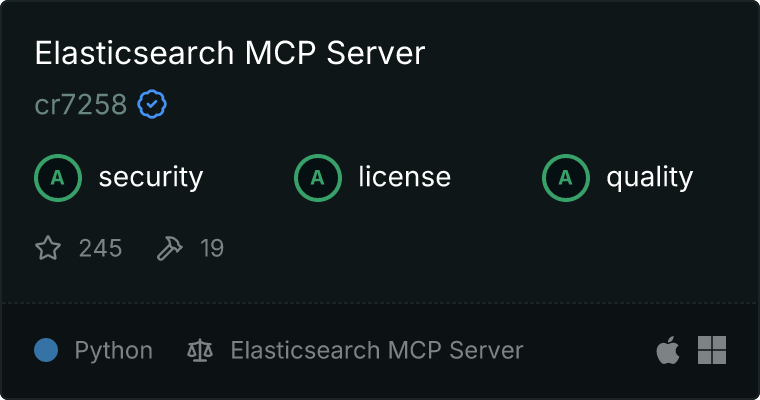# elasticsearch-mcp-server
**Repository Path**: jeady5/elasticsearch-mcp-server
## Basic Information
- **Project Name**: elasticsearch-mcp-server
- **Description**: mcp server
- **Primary Language**: Unknown
- **License**: Apache-2.0
- **Default Branch**: add-license-and-badge
- **Homepage**: None
- **GVP Project**: No
## Statistics
- **Stars**: 0
- **Forks**: 0
- **Created**: 2025-03-13
- **Last Updated**: 2025-03-13
## Categories & Tags
**Categories**: Uncategorized
**Tags**: None
## README
# Elasticsearch MCP Server
## Overview
A Model Context Protocol (MCP) server implementation that provides Elasticsearch interaction. This server enables searching documents, analyzing indices, and managing cluster through a set of tools.
https://github.com/user-attachments/assets/f7409e31-fac4-4321-9c94-b0ff2ea7ff15
 ## Features
### Index Operations
- `list_indices`: List all indices in the Elasticsearch cluster.
- `get_mapping`: Retrieve the mapping configuration for a specific index.
- `get_settings`: Get the settings configuration for a specific index.
### Document Operations
- `search_documents`: Search documents in an index using Elasticsearch Query DSL.
### Cluster Operations
- `get_cluster_health`: Get health status of the cluster.
- `get_cluster_stats`: Get statistical information about the cluster.
## Start Elasticsearch Cluster
Start the Elasticsearch cluster using Docker Compose:
```bash
docker-compose up -d
```
This will start a 3-node Elasticsearch cluster and Kibana. Default Elasticsearch username `elastic`, password `test123`.
You can access Kibana from http://localhost:5601.
## Usage with Claude Desktop
1. Add the following configuration to Claude Desktop's config file `claude_desktop_config.json`:
```json
{
"mcpServers": {
"elasticsearch": {
"command": "uv",
"args": [
"--directory",
"path/to/elasticsearch_mcp_server/src",
"run",
"server.py"
],
"env": {
"ELASTIC_HOST": "",
"ELASTIC_USERNAME": "",
"ELASTIC_PASSWORD": ">"
}
}
}
}
```
- On macOS: `~/Library/Application Support/Claude/claude_desktop_config.json`
- On Windows: `%APPDATA%/Claude/claude_desktop_config.json`
3. Restart Claude Desktop to load the new MCP server.
Now you can interact with your Elasticsearch cluster through Claude using natural language commands like:
- "List all indices in the cluster"
- "How old is the student Bob?"
- "Show me the cluster health status"
## Features
### Index Operations
- `list_indices`: List all indices in the Elasticsearch cluster.
- `get_mapping`: Retrieve the mapping configuration for a specific index.
- `get_settings`: Get the settings configuration for a specific index.
### Document Operations
- `search_documents`: Search documents in an index using Elasticsearch Query DSL.
### Cluster Operations
- `get_cluster_health`: Get health status of the cluster.
- `get_cluster_stats`: Get statistical information about the cluster.
## Start Elasticsearch Cluster
Start the Elasticsearch cluster using Docker Compose:
```bash
docker-compose up -d
```
This will start a 3-node Elasticsearch cluster and Kibana. Default Elasticsearch username `elastic`, password `test123`.
You can access Kibana from http://localhost:5601.
## Usage with Claude Desktop
1. Add the following configuration to Claude Desktop's config file `claude_desktop_config.json`:
```json
{
"mcpServers": {
"elasticsearch": {
"command": "uv",
"args": [
"--directory",
"path/to/elasticsearch_mcp_server/src",
"run",
"server.py"
],
"env": {
"ELASTIC_HOST": "",
"ELASTIC_USERNAME": "",
"ELASTIC_PASSWORD": ">"
}
}
}
}
```
- On macOS: `~/Library/Application Support/Claude/claude_desktop_config.json`
- On Windows: `%APPDATA%/Claude/claude_desktop_config.json`
3. Restart Claude Desktop to load the new MCP server.
Now you can interact with your Elasticsearch cluster through Claude using natural language commands like:
- "List all indices in the cluster"
- "How old is the student Bob?"
- "Show me the cluster health status"